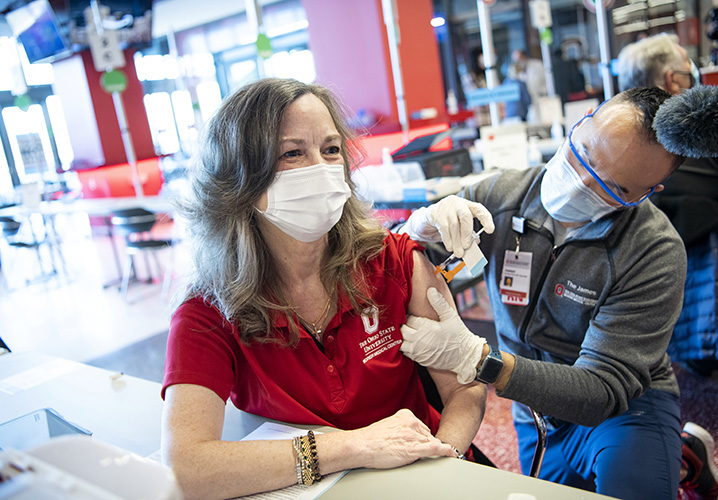Debunking current COVID myths
Struggling to filter fact from not-at-all fact? Ohio State's Dr. Bill Miller is here to help

Since the earliest days of the COVID-19 outbreak, myths about the virus have run rampant. Many of those myths have been petrifying and even dangerous, so having the actual facts in front of you is crucial for clarity and peace of mind.
Luckily, we have Dr. Bill Miller of Ohio State’s College of Public Health here to help us debunk, demystify and detangle the current myths around the virus, vaccines, testing and masks.
So without further ado, let’s let Dr. Miller clear up seven of the current COVID-19 myths:
I had COVID-19 last semester so I don’t need to be tested this semester.
Myth (mostly)!
The current Centers for Disease Control and Prevention (CDC) guidance is that someone who has had COVID-19 would not be tested again for 90 days unless they had symptoms consistent with COVID-19 that were unexplained by other diseases. We use a similar strategy at Ohio State. If you tested positive for COVID-19 (the first time) more than 90 days ago, you are included in the testing program. Reinfection with the virus does occur and those people could transmit it to others. The testing program, even of people who had COVID-19 previously, reduces campus transmission.
Face coverings and masks are all the same.
Myth!
Face coverings are not all the same. Gaiters and bandanas, especially when worn as a single layer, are less effective than a multiple layer cloth mask. Even cloth masks vary in performance. Procedure masks -- the disposable masks with the elastic that fits over the ears -- are better than cloth masks. N95 masks are the best masks available in the United States, but their use should be reserved for health care personnel, particularly if they are in limited supply.
I had COVID-19 so I don’t need a vaccine and don’t need to take safety precautions.
Myth!
As of now, we don’t know how long immunity to COVID-19 lasts. We know for sure that some people become reinfected with the coronavirus. The vaccine will help to ensure that you don’t have severe illness with a reinfection. Right now, everyone needs to continue with safety precautions!
Young and healthy people don’t need a vaccine.
Myth!
The vaccine protects against severe COVID-19 disease. Although COVID-19 is often milder in younger people, many young people become severely ill or die from COVID-19. The vaccine protects against that.
The vaccines were developed too fast and aren’t safe.
Myth!
The vaccines were developed fast but the evidence has shown that they are very safe. People may experience side effects (fever, fatigue, sore arm) in the first couple days after the injection but these are temporary.
Getting a vaccine will make me infertile.
Myth!
The vaccine will not cause infertility. That is not a side effect of this vaccine.
I got the COVID-19 vaccine so I don’t need to wear a mask or keep socially distant.
Myth!
The vaccine reduces the severity of illness and death. To date, the impact of the vaccine on transmitting or being infected with the virus is still being studied. Since we don’t know how often someone who has had the vaccine can become infected and transmit the virus, public health officials recommend that you continue to wear a mask and practice physical distancing. According to recently released CDC guidelines, you could relax that requirement if you’re fully vaccinated and visiting with someone else who has been fully vaccinated.
This story was originally published on osu.edu.
About The Ohio State University College of Public Health
The Ohio State University College of Public Health is a leader in educating students, creating new knowledge through research, and improving the livelihoods and well-being of people in Ohio and beyond. The College's divisions include biostatistics, environmental health sciences, epidemiology, health behavior and health promotion, and health services management and policy. It is ranked 22nd among all colleges and programs of public health in the nation, and first in Ohio, by U.S. News and World Report. Its specialty programs are also considered among the best in the country. The MHA program is ranked 5th and the health policy and management specialty is ranked 21st.